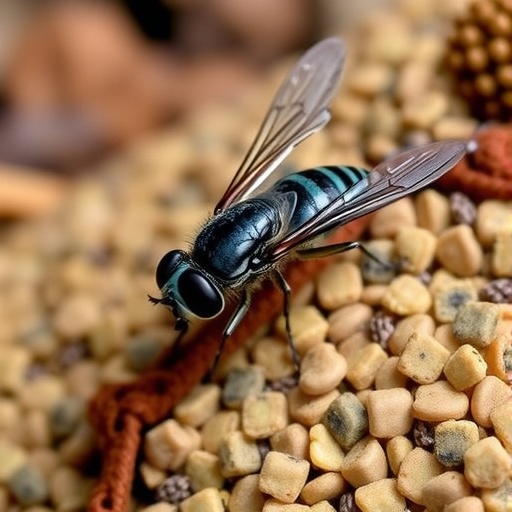The innovative approach to organic waste management has recently gained remarkable attention, particularly through the lens of utilizing Black Soldier Fly (BSF) larvae. A groundbreaking study led by Wu et al. unveils the multifaceted environmental benefits of harnessing these larvae beyond simple waste minimization techniques. This research not only highlights the larvae’s efficiency in recycling organic waste but also emphasizes their potential to contribute positively to ecological health and sustainability.
Black Soldier Fly larvae, known scientifically as Hermetia illucens, have emerged as a formidable ally against the mounting crisis of organic waste accumulation. They play a crucial role in the decomposition process, transforming food scraps, agricultural residues, and other organic materials into high-quality protein and nutrients. As society grapples with the challenges of waste management and food security, understanding the capabilities of these larvae becomes imperative.
Central to this research is the impressive rate at which BSF larvae can process organic waste. They are adept at converting waste into valuable biomass, which can be utilized as animal feed, thus presenting a dual advantage of waste reduction and food production. The study documents the larvae’s ability to thrive on a diverse range of organic substrates, which allows for greater flexibility in waste processing across various industries, including agriculture and food services.
Moreover, the environmental implications of using Black Soldier Fly larvae extend far beyond waste conversion. When organic waste decomposes anaerobically, it generates significant volumes of methane—a potent greenhouse gas. The larvae’s conversion of such waste into nutrient-rich biomass not only curtails methane emissions but also enhances carbon sequestration, positively influencing global climate change dynamics. This capacity illustrates a pivotal step towards mitigating the environmental impacts associated with traditional waste disposal methods.
Energy consumption in waste processing is another major area where BSF larvae prove advantageous. The larvae’s ability to thrive on low-energy diets reduces the overall carbon footprint associated with waste management systems. This means less reliance on energy-intensive thermochemical processes typically employed in waste treatment facilities, thus fostering a more sustainable and efficient approach to organic waste recycling. The synergy between waste reduction and energy efficiency sets this industry apart in the pursuit of sustainable development.
BSF larvae also present a remarkable opportunity to recover nutrients from organic waste, particularly nitrogen and phosphorus, which are vital for sustainable agriculture. Through comprehensive biochemical analyses, the study reveals that the larvae’s frass—essentially their waste—serves as an excellent biofertilizer. Rich in essential nutrients, this frass can significantly enhance soil fertility and reduce reliance on synthetic fertilizers, which are often a source of environmental pollution.
The implications for biodiversity and ecosystem health are equally significant. By promoting the circling of organic matter through natural processes, BSF larvae can contribute to healthier soil and plant systems. This positive feedback loop bolsters biodiversity, supporting a more resilient ecosystem that can withstand the stresses of climate change and human activity. The use of these larvae, therefore, aligns perfectly with contemporary environmental goals of promoting biodiversity and ensuring ecological integrity.
Educational and community engagement initiatives surrounding BSF larvae recycling are critical. Raising awareness about the potential of these larvae for organic waste recycling boosts public participation in sustainable practices. The study posits that scaling up community-based BSF farming could empower local populations, particularly in rural settings, to manage organic waste efficiently while generating income through the production of protein-rich products.
Policy implications stemming from this research are profound. The study calls for governments and policymakers to recognize the transformative potential of BSF larvae in environmental management strategies and frameworks. This recognition could lead to supportive regulations and incentives for the development of BSF farms, promoting investment in this burgeoning sector. By aligning policy with innovative waste management practices, governments can facilitate a shift towards a more circular economy.
In closing, the work of Wu et al. offers a compelling narrative about the integration of Black Soldier Fly larvae into organic waste management and ecological sustainability. The larvae stand not only to revolutionize how we think about waste but also to provide tangible pathways towards achieving environmental and agricultural goals. The framing of organic waste as a resource, rather than a burden, captures the essence of this research and promotes an optimistic outlook towards future environmental challenges.
The findings in this study emphasize that innovative solutions like BSF technology are not merely alternatives but essential components of a sustainable future. Transitioning to practices highlighting the natural recycling processes epitomized by BSF larvae represents a significant paradigm shift in waste management—a shift that promises long-term environmental, economic, and social benefits.
In summary, the transformational role that Black Soldier Fly larvae occupy in organic waste recycling serves as both a reminder and a beacon of hope. Their numerous environmental benefits underscore the urgent call for societies worldwide to embrace sustainable waste management practices as integral to our collective future. Only through such holistic approaches can we hope to address the pressing challenges posed by waste accumulation and ecological degradation.
Subject of Research: Organic Waste Recycling by Black Soldier Fly Larvae
Article Title: Environmental Benefits Beyond Waste Minimization
Article References:
Wu, L., Yan, Q., Li, J. et al. Organic Waste Recycling by Black Soldier Fly Larvae: Environmental Benefits Beyond Waste Minimization. Waste Biomass Valor (2025). https://doi.org/10.1007/s12649-025-03362-5
Image Credits: AI Generated
DOI: 10.1007/s12649-025-03362-5
Keywords: Black Soldier Fly larvae, organic waste management, environmental sustainability, nutrient recovery, methane reduction, community engagement.




